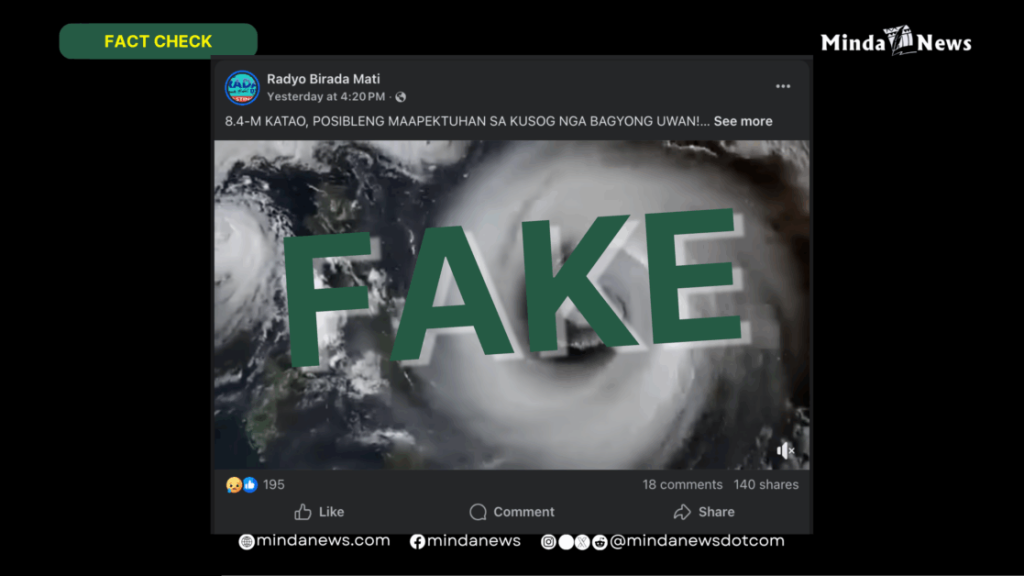Listen to the article
In an era where misinformation spreads rapidly across social media platforms, fact-checking has become a cornerstone of responsible journalism. Independent news organizations like MindaNews have embraced this challenge, particularly in regions vulnerable to false narratives.
MindaNews operates a systematic fact-checking initiative that evaluates claims through a clear classification system. Claims are rated as “Fake” when completely fabricated, “False” when they contradict verifiable facts or official records, “Misleading” when they manipulate truth to serve specific interests, “Altered” for manipulated images or videos, and “Missing Context” when additional information is needed for clarity.
This methodical approach to fact-checking reflects MindaNews’ broader mission since its 2001 founding: to serve as the “leading provider of accurate, timely and comprehensive news and information on Mindanao and its peoples.” The organization was established by journalists specifically to counter misinformation about Mindanao, an island grouping in the Philippines that has long been the subject of inaccurate reporting.
“Our policy has always been to ensure that reports are thoroughly vetted before they are dispatched and uploaded on our website,” states MindaNews, highlighting their commitment to journalistic integrity.
While fact-checking has always been integral to their work, MindaNews formalized their approach in October 2021 by participating in Internews’ Philippine Fact-Checker Incubator (PFCI) project. Internews, an international non-profit supporting independent media in over 100 countries, helped establish a structured format for their verification efforts.
The organization’s fact-checking credentials extend beyond this initiative. MindaNews was a co-founder of Tsek.ph, a collaborative effort among Philippine media institutions that worked to combat misinformation during both the 2019 and 2022 national elections.
Financial independence is crucial for maintaining editorial integrity in fact-checking operations. MindaNews sustains itself primarily through subscriptions to its news service and book sales. The organization also accepts grants from non-state actors, though it emphasizes that “editorial prerogative is left entirely to MindaNews.”
Their fact-checking initiatives specifically have received support from Internews (September 2021 to October 2022) and the BUILD grant administered by the International Fact-Checking Network (August 2023 to July 2024). For its broader operations, MindaNews has received funding from the National Endowment for Democracy and UNESCO, which helps cover reporting, staff compensation, administrative costs, and journalist training.
Importantly, MindaNews maintains a strict policy against accepting funds from politicians or domestic and foreign states for its fact-checking work, reinforcing their commitment to neutrality. “As a matter of policy, MindaNews does not allow these funders to interfere in our editorial processes,” the organization states.
Community engagement forms another pillar of MindaNews’ fact-checking approach. The organization actively encourages public participation, inviting readers to submit potential leads for verification. Each fact-check published includes a standard invitation: “As with all our other reports, MindaNews welcomes leads or suggestions from the public to potential fact check pieces.”
This collaborative model recognizes that effective fact-checking requires vigilance from both journalists and the public, especially in regions like Mindanao where accurate information is vital for community empowerment and development.
As digital misinformation continues to evolve, MindaNews’ systematic approach to verification illustrates how regional news organizations can adapt journalistic principles to meet contemporary challenges while maintaining their core mission of serving local communities with accurate, contextual reporting.
Fact Checker
Verify the accuracy of this article using The Disinformation Commission analysis and real-time sources.




7 Comments
I appreciate MindaNews’ mission to provide accurate, timely and comprehensive news about Mindanao. Countering misinformation in regions prone to inaccurate reporting is an important service.
Absolutely, building trust through fact-based journalism is vital, especially for communities that have historically faced challenges around reliable information.
This fact-checking effort highlights the need for increased digital literacy and critical thinking skills when consuming news, particularly around emerging technologies like AI. Verifying sources is crucial.
The creation of an AI-generated super typhoon and falsely attributing it to a local media outlet is quite concerning. Fabricating natural disaster information can have serious consequences for preparedness and response.
This is an important fact-checking effort to counter the spread of misinformation, especially regarding natural disasters and their impacts. Rigorous verification of claims is critical in the digital age.
I’m glad to see an established news organization like MindaNews taking a proactive approach to fact-checking. Differentiating between fake, false, misleading, and missing context claims is a thoughtful way to inform readers.
Agreed, their classification system provides helpful nuance beyond simply labeling something as true or false. Fact-checking is essential for maintaining journalistic integrity.